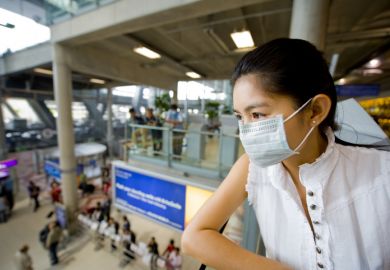Large swathes of the US research community have dropped their work to help tackle the coronavirus outbreak but have found their efforts hampered by major hurdles resulting from years of misplaced funding and institutional priorities.
Across the US, as elsewhere in the world, policymakers and public health officials trying to contain the deadly pandemic are seeing university scientists quickly shifting gears to join in.
Examples include a pair of University of Tennessee researchers who used a supercomputer to identify a possible drug candidate and a University of Texas team that helped to create the first atomic-scale map of a possible vaccine target.
Yet experts said the situation was exposing the failure by government funding agencies and, to some degree, industry and university leaders to have taken seriously the likelihood that a crisis such as that created by Covid-19 would occur.
Even a Trump administration official, while inaugurating a new panel created by the National Academy of Sciences to offer scientific expertise on the new coronavirus, admitted that the US had not done enough to maintain the capability to produce sufficient vaccines and therapeutic drugs for such a contingency.
“We’re realising now, in real time, some of the shortcomings,” said Christian Hassell, the senior science adviser for preparedness and response at the US Department of Health and Human Services.
The Sars outbreak of 2002 gave the world a clear warning of the need to devote a steady stream of resources to vaccine development, said Sallie Permar, professor of paediatric infectious disease, immunology and molecular genetics at Duke University.
“When you look across the landscape, there were relatively few labs that were able to be funded to continue to work on that,” Professor Permar said. “The model needs to change.”
Such funding decisions in turn skewed reward structures within universities, shifting them away from a more robust fulfilment of long-term public needs, said Arthur Caplan, a professor of bioethics at New York University. “It’s not like they’re anti-public health research,” Professor Caplan said of universities. “But it isn’t where the prestige is; it isn’t where the prizes are; it isn’t where the glory is.”
The situation has frustrated people such as Anthony Fehr, an assistant professor of infectious disease at the University of Kansas.
Dr Fehr said he was proud of the research community and its work on vaccines since the Sars scare. But he acknowledged that university scientists did not necessarily know how best to get their discoveries in front of drug companies, which in turn have little financial incentive to pursue them when no public health crisis is raging.
The work of creating a vaccine for Covid-19 could have been more advanced than it is now, Dr Fehr said, if government agencies had over the years been providing academic scientists with resources to whittle down their lists of compounds that could potentially inhibit coronaviruses by running them through preliminary tests of human safety.
“Then, we would have at least something to work with,” he said.
Register to continue
Why register?
- Registration is free and only takes a moment
- Once registered, you can read 3 articles a month
- Sign up for our newsletter
Subscribe
Or subscribe for unlimited access to:
- Unlimited access to news, views, insights & reviews
- Digital editions
- Digital access to THE’s university and college rankings analysis
Already registered or a current subscriber?







